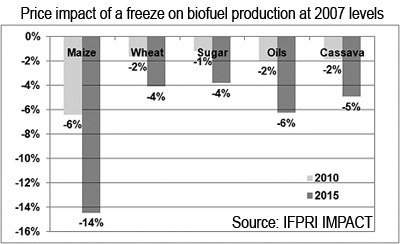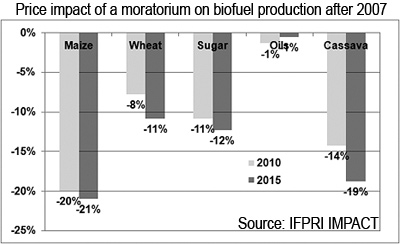Global ban on biofuels would lead to immediate decline in food prices
Global ban on biofuels would lead to immediate decline in food prices
mongabay.com
May 16, 2008
|
|
A global moratorium on biofuels produced from food crops would result in a significant decline in the price of corn, sugar, cassava and wheat by 2010, according to testimony before the U.S. Senate Committee on Homeland Security and Governmental Affairs by Mark W. Rosegrant Testimony of the International Food Policy Research Institute (IFPRI).
With food prices surging more rising demand, misguided government policies, and weaker than expected harvests, IFPRI analyzed the impact of freezing or eliminating biofuels production from food crops. The group found that holding biofuels production steady at 2007 levels would result in a 6 percent decrease in corn (maize) prices by 2010 and 14 percent by 2015. Smaller price reductions would be expected for oil crops (2 percent), cassava (2 percent), wheat (2 percent), and sugar (1 percent) by 2010.
A global moratorium on crop-based biofuel production would result in greater price declines in food crops: 20 percent for corn, 14 percent for cassava, 11 percent for sugar, and 8 percent for wheat by 2010.
  Change in selected crop prices if biofuel demand for all crops was (1) fixed at 2007 levels and (2) eliminated after 2007 |
Rosegrant said that while the removal of mandates and subsidies for ethanol and biodiesel in the United States and Europe would lead to lower food prices in the short term, improving agricultural productivity, infrastructure and food policies in developing countries will have a greater effect on food prices in the long term. Greater investment in agricultural research and development will also help improve food security and the well-being of the world’s poorer and more vulnerable populations.
Food prices jumped by 40 percent in 2007 and climbed higher in early 2008. Since January 2006, the average world price for rice has risen by 217 percent, wheat by 136 percent, maize by 125 percent and soybeans by 107 percent.
Fertilizer prices have also boomed, with diammonium phosphate prices increasing 200 percent in 2007 and potash doubling.
Higher prices have kicked off food riots in dozens of countries. Responses from governments have been mixed; some have implemented policies — including export bans — that exacerbate the crisis by encouraging food hoarding. The World Food Programme has said it needs more money to maintain its food distribution efforts.
Biofuels and Grain Prices: Impacts and Policy Responses. Mark W. Rosegrant Testimony before the U.S. Senate Committee on Homeland Security and Governmental Affairs May 7, 2008